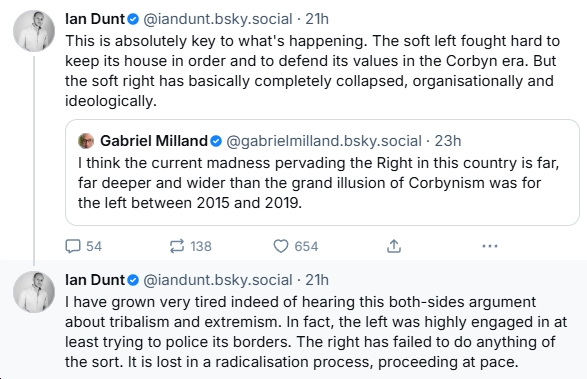The evidence that Israel is deliberately starving the Gazan population if not to death then to a state of extreme malnutrition that will scar it for generations is now irrefutable. This has led to some predictable hand-wringing by centrist commentators, such as Gaby Hinsliff demanding a more virtuous response from a UK government that has not only been complicit in Israel's genocidal war but has actively criminalised principled opposition to it. We are told that pressure is mounting on Starmer to recognise a Palestinian state, even though this would do nothing to alleviate the suffering. If Emmanuel Macron thinks it's a good idea, you can be confident it's an empty gesture. In reality, the UK government is never going to recognise a free Palestine, something that the cabinet ministers briefing the press about their support for it know perfectly well. They are trying to protect their career prospects, or at least avoid being sacked by the electors, by crying crocodile tears for starving children.
What is notable is not just the abject cowardice of the response by centrists like Hinsliff but their refusal to accept that the time has come for the UK government to take meaningful steps, such as an arms embargo or sanctions against Israel. This is not just a transparent attempt to obscure their failure to advocate a stronger line months ago, when the direction of travel was obvious. It also highlights their own commitment to what we really should start calling the final solution of the Palestinian problem. Just as the government will never recognise an independent Palestine, so the commentariat will never admit that the goal all along has been the erasure of the Palestinians as a people with a land. You might as well ask them to admit that the Labour Party wasn't riddled with antisemitism between 2016 and 2019, and wholly free of that bacillus before and after.
This refusal to face the reality of their choices creates a psychic burden that needs some form of release. To no one's great surprise, as the evidence of genocide and the strategic use of starvation has mounted, so the centrist hatred of the left has reached an even more hysterical pitch. While Paul Mason insists that the new party mooted by Jeremy Corbyn and Zarah Sultana would be the re-embodiment of the German Communist Party, paving the way for Hitler/Farage, Nick Tyrone, a self-styled centrist dad and think-tank wallah, opined that "literally anyone" would be better in government than the two former Labour MPs. You might think this was mere hyperbole, rather than literally meant, but the point is that he really would prefer Nigel Farage, or (for that matter) Boris Johnson or Liz Truss. These people have never been shy about admitting their hierarchy of acceptable politics.
Mason at least professes to abhor Farage, but that's really just to maintain his anti-Fascist credentials among credulous liberals and his self-deluding image as a latterday SPD street-fighter that the Labour Party would be foolish not to select as a prospective parliamentary candidate for a seat in the North. Tyrone is honest enough to admit that the political centre in this country is occupied by people who would much rather see Farage in Number 10 than anyone happy to self-describe as a socialist, which funnily enough is a more accurate historical echo of Germany in 1933, when the centre-right paved the way for Hitler, than Mason's crass analogy. Another example of centrist fantasy, built to obscure the reality of right-leaning preferences, comes from the journalist Ian Dunt.
The "soft left" in Labour barely exists outside of the media's imagination and is certainly not organisationally robust enough to fight anyone. The mystery of the missing "soft-right" is easily explained: they're all in the Labour Party furiously fighting the left. In simple terms, the political establishment, which is coterminus with the widest definition of "the centre", has decided that it will not fight the far-right because the electorate is made up of incorrigible racists. The protestors outside asylum hostels must be placated with guff about "legitimate concerns", until they overstep the mark at which point they become suitable fodder for a crackdown. Meanwhile, Nigel Farage must be indulged not only by the rightwing press and a complacent BBC but by the political establishment as a whole. Instead, attention must be focused on the threat from the left, who must be stamped on hard along with anyone deemed a proxy, such as trans men and women or protestors against genocide.
Centrist commentators who loudly gave Israel the benefit of the doubt for years, and who now regretfully inform us that they may have been wrong to do so, are demanding that they be applauded for changing their minds. There is no humility or contrition, merely a testy anger that they have been bested in analysis by ageing hippies and pink-haired kids. Some have even taken to aggressively denouncing the left, who have been proved right, for not welcoming them into the big tent of bien pensant opinion, insisting that in the face of starving children what matters is civility and tone. What these sociopaths are ultimately defending is their authority within the politico-media complex. To that end, it is necessary that they continue to construct a leftwing bogey that can act as the scapegoat for the projected charges of naivety and delusion. For many of them, the launch of a new party by Corbyn and Sultana is a blessing.





